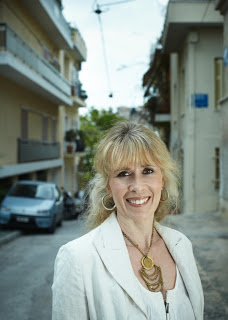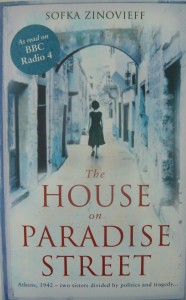In following with my theme of interviewing authors, today I have the pleasure of interviewing Sofka Zinovieff. She is the successful author of various titles including Eurydice Street: A Place in Athens and Red Princess. Today I interview her about her latest title:

Sofka Zinovieff was born in London and is half-Russian – her father’s parents were both from St Petersburg and escaped to England after the 1917 revolution.
She studied social anthropology at Cambridge(getting a first-class degree). During the late 1980s she lived in Greece for several years, while carrying out research for her PhD thesis.
During the 1990s she lived in Moscow (where she met her Greek husband, Vassilis Papadimitriou), London(where their two daughters were born) and for several years in Rome. She worked as a freelance journalist, writing for mainly British publications including The Independent Magazine, The Telegraph Magazine, The Times Literary Supplement, The Financial Times, the London Magazine.
Sofka, your other Greek book “Eurydice Street…” was based on your experiences of coming to Athensto live. “The House on Paradise Street” is a novel spanning three generations of one family and is based in Greece. How did you go about researching your characters for this? They are so rich and varied, I imagine the research stage of this book, in order to be factually correct, must have taken a long time.
I did my research in various ways, but the most significant one was getting to know people who had been through the sort of experiences I wanted to write about. Above all, this was people who had been alive during the Nazi occupation and the subsequent Civil War. However, I’ve been involved with Greecesince I was a student, I’m married to a Greek, and I have brought up my children in Greece. So although the characters are not specifically based on particular people, I’ve taken various features from those I’ve met over many years. Inevitably, I’ve also used myself to draw on emotions for all sorts of different fictional characters, even if they have lived things I haven’t.
As well as interviewing people, I also did quite a lot of reading and visiting places so I’d get them right. Although the book is fiction, I wanted to be sure of the historical facts that have such a devastating effect on the book’s characters.
Through gentle humour and an ability to warm us to the characters, you lead us through the shocking events of the Greek Civil War and junta years, a period of history that is not very well known about outside of Greece. Why do you think this is? Why is Greece’s modern history not so acknowledged externally?
I’ve been amazed by how many non-Greeks reading the book have said, “I had no idea about the Civil War, and especially that the British army was involved.” These things are not taught in school history lessons. The easy answer might be that Greece was a small theatre of war compared to many others, but I’d suggest that these complex tangles are also much harder to represent with an easy morality of right and wrong that comforts us in justifying war and violence. I found it shocking when I learned that British soldiers, who had fought the Nazis alongside Greek partisans, found themselves only months later, in 1944, killing those same partisans on the streets of Athens. Churchill was determined to stamp out the threat of Communism, but the scars divided Greeks for a long time.
As an ‘adopted Greek,’ did you find parts of the research process painful for you to read, especially regarding British interests in Greece at the time?
I feel privileged to be an adopted Greek in that I can often see things both as an outsider and an insider. But sometimes that means you can feel the pain on both sides too. I found it very difficult to find out about how many young and old women had been imprisoned after the war, merely for having fought the Nazis or supported the partisans. Many of them had their young children with them or even, like Antigone in my story, gave birth in prison. Uncovering the fact that the British had given support to the right wing, some of whom had been Nazi collaborators, and who kept their enemies locked up, or executed them, right into the 1950s and ‘60s, was an unpleasant thing to confront as a Brit. However, I believe that facing up to these things is important. I wanted to write these stories as a novel, so I could get inside the minds of the British as well as the Greeks, in modern Athens as well as in the past.
For me it was particularly enlightening to read about Greece’s modern history, but felt I was discovering it in an interesting way, through the lives of fictitious characters. Thank you for helping me to understand Greece and the Greek mentality…this is what I took from your book: in order to understand the present, one needs to look at the past.
“The House on Paradise Street” is a must read for anyone interested in Greece and the way the country functions now, due to its past. It is both enlightening and touching.
Further information: Sofka moved to Greece in 2001 and lives by the sea outside Athens with Vassilis and their daughters, Anna and Lara.
Eurydice Street: A Place in Athens was published by Granta in 2004 (paperback 2005). It received widespread and excellent reviews, was listed as one of the New York Times 100 Notable Books of 2005, and has been translated into 3 languages.
Red Princess: A Revolutionary Life is a biography of her Russian grandmother and her controversial and turbulent existence. It was published by Granta in February 2007 and has been translated into 10 languages.
Author Picture source: culturalconnectionsfestival.com & Featured image source: http://www.allaboutshipping.co.uk/2012/06/26/the-house-on-paradise-street/

